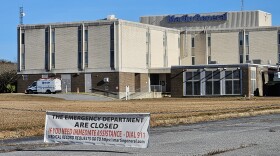At Preston Medical Associates in Cary, there's been a resurgence of patients calling in with COVID-19 symptoms.
Schquthia Peacock is a nurse practitioner and co-owner of the practice. She's again been rolling her outdoor cart into the parking lot, something she had hoped she wouldn't have to do anymore.
She points out the checklist of items on the cart.
"We have our little sanitizing spray, I have my hand sanitizer, have a thermometer, our goggles, I have a pulse ox because that's an important thing to do an evaluation. We can check your oxygen status as well as your pulse," she says.
Out of the side door, the practice set up a three-bay tent. It offers patients with COVID-19 symptoms a bit more privacy than receiving treatment in the parking lot, but keeps them from coming inside the facility and potentially spreading the virus. Peacock says that in the spring, she had begun to hope they could take the tent down soon. But with the resurgence in cases, that's not going to be possible.
"Just a few weeks ago, I had a family of eight, that were all COVID positive," she says. "All of them unvaccinated."
Back inside, Peacock says she and other providers are disappointed and a bit frustrated at the rise in COVID-19 cases. Especially as a vast majority of cases are among unvaccinated people.
"I try to work really hard to communicate the need of (the vaccine) to the community," she says. "And the need to keep COVID under control for the sake of health care providers. For the community. For their family. For my family."
Still, she's able to give full care to every patient, regardless of the reason they come to her practice.
"As a health care provider, as a nurse, we go in and take care of the patient, because they are the person, not because they have a condition or a disease," she says. "And so that's the way I see my patients. They are the person first, and I treat them as that."

It's a mix of emotions shared by providers around the state who have begged people to get the vaccine. Providers like Alan Fanning, a nurse in the UNC Medical Center Intensive Care Unit.
"It's particularly sad and tragic that most of these particular patients, the COVID patients, it's completely avoidable," he says.
Down I-40 at UNC-REX Hospital in Raleigh, Fanning's colleague Jennifer Lee is a nurse manager whose team sees patients with severe COVID-19 symptoms. She says her staff has been overworked.
"Right now that we're going into is staff is exhausted," she says. "We are exhausted."
During the pandemic, many people avoided care for non-COVID related illnesses because they didn't want to risk catching the coronavirus. Now, they are sicker, and require more attention. But hospital beds are again filled up with COVID-19 patients.
"Yeah, these are COVID numbers. But that means these are beds I don't have for sick patients," Lee said. "And I'll tell you, after COVID, I was full of medical patients."
The nursing profession has always had high turnover, but it's even higher now. That means those nurses who do come to the hospital are putting in a lot of overtime, says Fanning.
"All of us, were really terrified that at some point, through exhaustion and burnout, we're just really not going to be able to give the care that people should expect and that we expect to give," he says. "And this causes a whole lot of, you know, moral hazard."

It's that concern for patients that drives the mix of emotions of nurses, and why they plead with people to get the vaccine, says doctor Adia Ross, the Duke Regional Hospital chief medical director.
"Frustrations may come out from some healthcare professionals being frustrated. (But) I think we're mainly sad," she says. "When I talk to my kids about anger being a secondary emotion, it's like, 'Are you mad, sad? Are you mad, scared?' And I think many of us feel a little bit of both."
By time patients with advanced COVID-19 symptoms come to the hospital, it can be too late to offer treatments that quickly make them feel better. And that hurts providers, especially nurses who see these patients for hours throughout a shift.
"We want to help people right? And I think it can make you feel very helpless when we know we have a vaccine that we know can help people and yet we are struggling to convince them," says Ross.
Especially when nurses and all health care providers are generally viewed as trustworthy.
"We are the most trusted profession now for over 20 years. And why the public is not listening to what we're recommending is sometimes a little baffling to us," says Dennis Taylor, president of the N.C. Nurses Association. "What we have really asked folks to do is follow the science. There's a lot of science in nursing.
"And if you follow the science, the vaccine is extremely safe."







